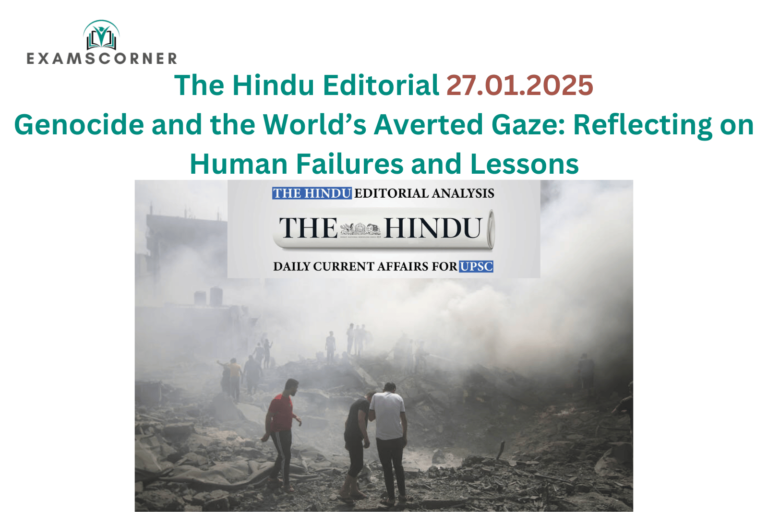On January 27, 1945, Soviet soldiers liberated Auschwitz-Birkenau, uncovering the remnants of one of the most horrifying episodes in human history. Inside the camp’s barbed wire, they found 8,000 emaciated prisoners, along with grim remnants of humanity’s suffering: 44,000 pairs of shoes, piles of spectacles, and cooking utensils. These were haunting symbols of the approximately 1.1 million people, predominantly European Jews, systematically murdered at Auschwitz, (Genocide and the World’s Averted Gaze).
The Nazis, in their retreat, destroyed much of the evidence of their industrial-scale atrocities. Despite this, the Holocaust left indelible scars, claiming six million Jewish lives and countless others, including Roma, Sinti, and political opponents. As the world marks the 80th anniversary of Auschwitz’s liberation, survivors and global leaders gather to renew the pledge: never again should such atrocities be allowed to occur.
Understanding Genocide
The term “genocide” was codified in the Genocide Convention of 1948, which defines it as “acts committed with the intent to destroy, in whole or in part, a national, ethnical, racial, or religious group.” Despite this recognition, genocide remains a recurring stain on human history. United Nations Secretary-General António Guterres has repeatedly warned that genocide is always preceded by clear warning signs, yet the international community often fails to act in time.
The Holocaust: A Failure to Act
The Holocaust provides a grim example of international inaction. When the Nazis rose to power in 1933, they codified their persecution of Jews through laws like the 1935 Nuremberg Laws, which stripped Jews of German citizenship. Attempts by Jews to emigrate faced significant obstacles, from restrictive immigration laws in the United States to bureaucratic hurdles in the United Kingdom. By 1941, Germany had prohibited Jewish emigration altogether, leaving many trapped.
Global conferences, such as the Evian Conference of 1938 and the Bermuda Conference of 1943, offered little more than sympathetic statements. Reports of mass killings, including the infamous Riegner telegram of 1942, were ignored or downplayed. The Allies, despite mounting evidence, failed to prioritize intervention.
Post-Holocaust Genocides: “Never Again” Repeatedly Broken
The promise of “never again” has been repeatedly broken in subsequent decades. Genocide has recurred in:
- Cambodia (1975-1979): The Khmer Rouge, under Pol Pot, killed an estimated two million people through executions, starvation, and forced labor. Cold War politics complicated international responses, as China and Western nations supported the fleeing Khmer Rouge, while Vietnam’s intervention faced condemnation.
- Rwanda (1994): Over 100 days, approximately 800,000 to 1,000,000 Tutsi and moderate Hutu were massacred. Despite the clear warning signs, the UN peacekeepers were left powerless, and global leaders hesitated to intervene.
- Srebrenica, Bosnia (1995): In a declared UN “safe zone,” 8,000 Bosnian Muslim men and boys were executed in a campaign of ethnic cleansing. Reinforcements requested by UN peacekeepers never arrived, underscoring international indecision.
- Darfur, Sudan (2003-2005): An estimated 200,000 people were killed, with the International Criminal Court (ICC) later recognizing the violence as genocide. The crisis persists, with fears of renewed atrocities as global attention shifts elsewhere.
The Gaza Crisis: Examining Modern Allegations
As the world commemorates Auschwitz’s liberation, another humanitarian crisis unfolds in Gaza. Following Hamas’s October 2023 attacks, Israel’s military response has led to widespread devastation. The International Court of Justice (ICJ) is currently investigating whether Israel’s actions constitute genocide. Arrest warrants have been issued for Israeli leaders and Hamas officials, though Western nations have criticized any perceived equivalence in accountability.
The death toll in Gaza has surpassed 47,000, primarily women and children, with 92% of homes destroyed and entire populations repeatedly displaced. Gaza remains under siege, with foreign press barred and international responses muted. The world’s acquiescence raises critical questions: Where is the line between self-defense and genocide? When does international support become complicity?
Lessons and the Way Forward
History has shown that genocide thrives when the world looks away. From the Holocaust to modern-day crises, indifference and geopolitical calculations have often taken precedence over humanity. As nations gather to remember Auschwitz, they must also reflect on their failures to act in Cambodia, Rwanda, Bosnia, Darfur, and now Gaza.
Preventing genocide requires vigilance, early intervention, and an unwavering commitment to human rights. The international community must move beyond symbolic gestures and ensure accountability, irrespective of political alliances. Only then can the pledge of “never again” truly hold meaning.
Need to Know for UPSC: Genocide Convention of 1948, United Nations Secretary-General, Bermuda Conference of April 1943, International Criminal Court, International Court of Justice.
Source: The Hindu



